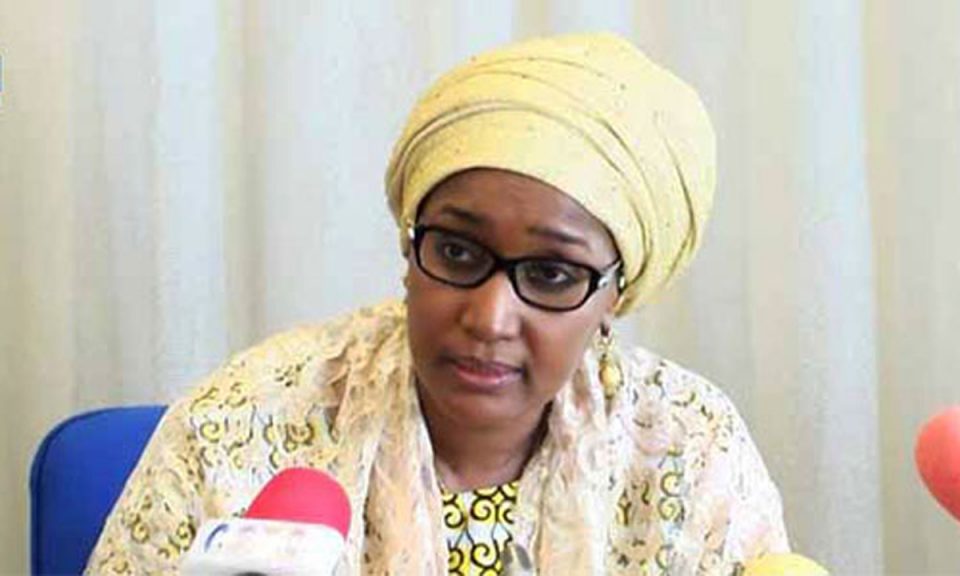- Food distribution to 37,589 families begins in Lagos
The plan to feed school children at home is not a scam, Minister of Disaster Management, Humanitarian Affairs and Social Development, Hayiya Sadiya Umar Farouq, said on Thursday.
She defended the Federal Government’s decision to spend N679 million on the programme.
The minister spoke in Lagos at a programme to begin the distribution of food items under the National Home Grown School Feeding Programme (NHGSFP) at the St. Francis Primary School in Maryland.
She was represented by the Director of National Commission for Refugees, Immigrants and IDPs, Mrs Margaret Ukaegbu.
According to her, feeding children at home is an internationally accepted practice to check food insecurity and malnutrition among vulnerable people during emergencies.
The minister added that 16 other countries, such as Liberia and South Africa, were feeding children, despite school closure.
“So, the idea of take-home rations is not unique to Nigeria, neither is it a scam. It is a globally accepted means of continuing to have access to nutrition and nutritionally-rich foods, despite disruptions to the traditional channels of school feeding,” she said.
Special Assistant to President Muhammadu Buhari on the NHGSFP, Mrs Titilola Adeyemi-Doro, said 37,589 households were selected out of about 112,767 pupils benefiting from the school feeding programme in Lagos based on their vulnerability.
“Knowing fully well that the resources available could not cover all households with pupils in primary 1 -3 across the public schools, the team engaged the community to formulate the definition of being poor and not being able to provide for their wards – women or widow-headed households, households headed by persons with a disability, households whom the head has lost his or her job and have no or little income among other criteria,” she said.
Each family will get 5kg bag of rice, 5kg bag of beans, 500ml of vegetable oil, 700ml of palm oil, 150mg of tomato paste, half a crate of eggs, and salt.
The pilot beneficiaries cut across seven Local Government Education Authorities (LAGEAs), including Somolu, Oshodi-Isolo, Apapa and Kosofe.
Chairman of Lagos SUBEB Wahab Alawiye-King said the initiative would continue monthly as long as schools remain closed.
Lagos State Education Commissioner, Mrs Folasade Adefisayo, urged parents to use the rations to prepare nutritious meals for the pupils and boost their intelligence quotient.
Lagos Government Holds Safety Talks with Downstream Oil Operators
The Lagos State Government has met with stakeholders in the downstream sub- sector of the oil industry over safety of the operators.
There have been a series of fire incidents involving petroleum tankers in the state.
The Commissioner for Energy and Mineral Resources, Olalere Odusote, during the virtual meeting on Thursday said, “the Governor is keen to see the downstream sector flourish but operators must stay within the framework of safety provided by the laws of the state.”
According to a statement released by the State Government, the meeting was to deepen safety awareness of operators, given the spate of fire incidents involving petroleum tankers in recent times.
The commissioner said the workshop was organised,, ” to address the recurrence of such hazardous incidents, and to seek effective and lasting solutions that align the interests of all stakeholders.”
He said Lagos State, “has commenced the process of creating fully equipped truck transit parks and terminals to eliminate the indiscriminate parking of trucks.
“The technology-based Integrated Terminal Management System, where tickets are issued prior to proceeding to the loading bays will be introduced, in addition to the enforcement of the annual certifications for tanker drivers and trucks that ply Lagos roads” he added.
He urged all stakeholders to implement an optimal framework to curb the excesses of tanker operators.
The Commissioner for Transportation, Frederick Oladeinde, said, “relevant infrastructure to facilitate vehicle testing will be made available at mutually agreed designated points to support the downstream sector.”




